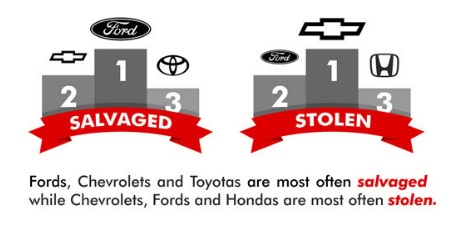In the automotive industry, title washing refers to the illegal practice of altering or “washing” a vehicle’s title to remove or hide its history, particularly when it has been in an accident, has flood damage, or has been stolen. This is typically done by changing the title in a way that makes it appear clean or free of any serious damage. Title washing allows the vehicle to be sold as if it has no major issues, which misleads buyers.
Here’s how title washing typically works:
- Rebranding the Vehicle: A vehicle with a salvage, flood, or rebuilt title is often transferred to a state that does not have strict title regulations.
- Re-Registration: The car is then re-registered in that state, and a new title is issued, potentially erasing the vehicle’s problematic history.
- Selling: Once the title is washed, the car can be sold with a clean title, making it appear as though it has never been damaged.
Carfax Online VIN Checker:
Title washing is illegal and highly unethical, as it puts consumers at risk of buying unsafe vehicles that may have serious hidden problems. Buyers should always check a vehicle’s history through services like Carfax or AutoCheck to ensure they are aware of any potential issues with the car’s title.
What is a Clean title?
A clean-title vehicle is one that has never been declared a total loss by an insurance company. This status is documented through titles issued by the Department of Motor Vehicles (DMV) or similar agencies.
What are the three types of titles?
The three main types of vehicle titles are:
- Clean Title: The vehicle has not been declared a total loss by an insurance company.
- Salvage Title: The vehicle has been declared a total loss but can be repaired and reinstated.
- Rebuilt Title: The vehicle was previously given a salvage title, but it has been repaired and inspected for roadworthiness.
What is the difference between a clear and clean title?
The main difference between a clear and clean title is that:
- A clean title means the vehicle has never been declared a total loss by an insurance company.
- A clear title indicates the vehicle has no legal issues, such as liens, but it does not necessarily mean the vehicle hasn’t been in a major accident or declared a total loss.
Title Rebranding:
This refers to changing the registration or legal title of a vehicle, which could include:
- Title Washing: As mentioned earlier, this is when a vehicle’s title is altered or “washed” to remove records of accidents, flood damage, or a salvage history. It is done illegally to make a vehicle seem like it has a clean history, allowing it to be sold at a higher price without disclosing any previous issues.
- Reclassifying the Vehicle: Sometimes, vehicles that were previously classified as “salvage” or “rebuilt” can be re-registered in states with looser regulations, issuing a “clean” title for resale purposes.
Legal and Ethical Implications:
While cosmetic rebranding can be legal, title rebranding (especially through washing) is illegal and unethical, leading to potential fraud charges. Consumers should be aware of a vehicle’s history, and it’s crucial to always verify the title and history before purchasing a vehicle.
To protect yourself from vehicle title washing, you should follow these key steps when buying a used car:
1. Check the Vehicle History Report:
Always request a vehicle history report through services like Carfax or AutoCheck. These reports provide valuable details about the car’s history, including whether it has ever been in a major accident, had flood damage, or was branded with a salvage or rebuilt title.
2. Verify the Title with the DMV:
Contact your state’s Department of Motor Vehicles (DMV) or equivalent to verify the title history. They can confirm whether the title has been changed or reissued in a different state. This can help you identify potential title washing.
3. Examine the Title for Red Flags:
Inspect the physical title for inconsistencies, such as:
- Missing or altered information (e.g., names, VIN, or odometer readings).
- Signs of tampering, such as erasure or multiple corrections.
- Discrepancies in the state or county listed on the title (indicating possible re-registration in a different state).
4. Look for State Title Brands:
Some states issue brand codes on titles to indicate the vehicle’s status (e.g., “salvage,” “flood,” “rebuilt,” or “rebuilt wreck”). Check whether the title has any of these brands, which indicate a problematic history. Be cautious if the title has been “cleaned” and lacks this information.
5. Get a Professional Inspection:
Have a trusted mechanic or inspection service examine the vehicle for any signs of damage, repairs, or issues that could indicate the car has been in an accident or had significant repairs.
6. Be Cautious of Unusually Low Prices:
If the price of the car is significantly lower than similar models, it could be a red flag. Title-washed vehicles may be sold for much less to quickly get rid of them.
7. Ask the Seller for Documentation:
Request to see the full service and repair records. A reputable seller will have a clear record of the car’s maintenance history, and inconsistencies here can signal potential issues.
By following these steps, you can protect yourself from falling victim to title washing and ensure you’re buying a car with a legitimate history.
Certain vehicle brands and models are more likely to end up with salvage titles due to factors such as popularity, repair costs, and accident frequency. While any vehicle can potentially be salvaged, some are more commonly involved in incidents that lead to salvage titles:
1. Luxury Brands:
Luxury vehicles often have higher repair costs, making them more likely to be declared a total loss after an accident or damage. Common luxury brands with higher salvage title occurrences include:
- Mercedes-Benz
- BMW
- Audi
- Lexus
- Porsche
2. Sporty and High-Performance Models:
Sports cars and high-performance vehicles, due to their speed and the way they are driven, are more prone to accidents. These can also be more expensive to repair, leading to them being declared as salvaged. Examples include:
- Chevrolet Corvette
- Ford Mustang
- Dodge Challenger
- Nissan GT-R
- Toyota Supra
3. Pickup Trucks:
Because of their high utility and usage in work environments, pickup trucks are frequently involved in accidents. The structural damage or wear can lead to them being declared salvage vehicles. Common brands are:
- Ford F-150
- Ram 1500
- Chevrolet Silverado
- GMC Sierra
- Toyota Tacoma
4. Popular Mainstream Brands:
Some brands that produce mass-market vehicles can also see a higher rate of salvaged titles simply because they are more common on the road. These vehicles are often involved in accidents, and due to their availability, the cost of repairs can lead to salvage declarations:
- Honda Civic
- Toyota Camry
- Nissan Altima
- Honda Accord
- Chevrolet Malibu
5. SUVs and Crossovers:
Large vehicles like SUVs and crossovers are often in accidents due to their size and weight. When these vehicles incur damage, they may be written off as a total loss. Some of the more common models are:
- Jeep Grand Cherokee
- Chevrolet Tahoe
- Ford Explorer
- Toyota Highlander
- Honda CR-V
While certain brands and models are more likely to be salvaged, the likelihood of a vehicle being given a salvage title depends on many factors, including its age, condition, and repair costs. Always check the vehicle’s history and consider having it inspected before purchasing a used car, especially from high-risk categories.
Certain vehicle brands and models are more frequently targeted by thieves due to factors like popularity, high resale value, and demand for parts. Here’s a list of vehicle brands that are most often stolen:
1. Honda
- Honda Civic and Honda Accord are among the most stolen vehicles. The high demand for these vehicles’ parts and their popularity on the road make them prime targets for theft.
2. Toyota
- Toyota Camry, Toyota Corolla, and Toyota Tacoma are commonly stolen. Like Honda, Toyota vehicles are popular, and their parts are in high demand for resale or for use in other vehicles.
3. Ford
- Ford F-Series (especially the F-150), along with Ford Mustang, is frequently targeted. The F-Series is popular for its utility, and the Mustang’s high value makes it appealing to thieves.
4. Chevrolet
- Chevrolet Silverado and Chevrolet Tahoe are among the most stolen vehicles. These trucks and SUVs are highly sought after, both for their parts and resale value.
5. Nissan
- Nissan Altima and Nissan Maxima are popular targets. The demand for these sedans and their relatively easy-to-steal nature make them prime candidates for theft.
6. Hyundai
- Hyundai Elantra and Hyundai Sonata are commonly stolen, largely due to their popularity and the value of their parts on the black market.
7. Jeep
- Jeep Grand Cherokee and Jeep Cherokee are frequently stolen, often due to the demand for their parts, especially among off-road enthusiasts.
8. BMW
- BMW 3 Series and BMW 5 Series are targeted by thieves due to their luxury status and the high demand for parts and resale value.
9. Lexus
- Lexus RX and other luxury Lexus models are commonly stolen for their high value and parts, as well as for resale in international markets.
10. Ram Trucks
- Ram 1500 and other full-sized trucks are often stolen for their parts and because of the demand for these vehicles in various industries.
Why These Vehicles Are Stolen:
- High Demand for Parts: Many stolen vehicles are stripped for parts, which are often sold individually on the black market.
- Popularity: Vehicles like the Honda Civic or Ford F-150 are on the road in large numbers, making them attractive targets for thieves due to their widespread use.
- High Resale Value: Luxury brands like BMW and Lexus are often stolen for resale on the black market, both in parts and whole.
- Ease of Theft: Some older models or vehicles without advanced anti-theft technology are easier for thieves to steal.
To protect yourself from vehicle theft, consider installing security measures like GPS tracking systems, steering wheel locks, and car alarms. Additionally, always park in well-lit areas and avoid leaving valuables visible inside your car.
To prevent being subject to a Title Washing scam buy a vehicle history report before purchasing any used vehicle, you can use a few trusted online services that provide detailed reports about a vehicle’s past. These reports typically include information on accidents, title issues, ownership history, mileage discrepancies, and more. Visit our website to get your vehicle history report.


